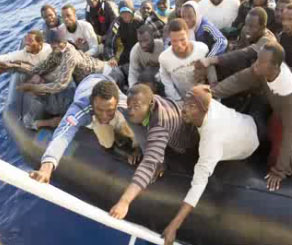text below from http://nobordersbrighton.blogspot.com/
Racist Attack Provokes Riot In Southern Italian Town
A racist attack on African migrant farm workers in the Southern Italian region of Calabria by a gang of local youths armed with air rifles has provoked a series of disturbances in the town of Rosarno. Last night hundreds of cars were damaged and set on fire as the migrants sought revenge for the attack that left several of them injured.
Earlier today, some migrants erected road blocks on the main roads into the town, whilst shop windows were again smashed as up to 2,000 immigrants gathered to protest outside city hall, chanting “we are not animals” and waving placards saying “Italians here are racist”. They demanded to see the town’s government commissioner, Francesco Bagnato, appointed last year when the town council was disolved to try and combat local influence of the mafia.
He tried to reassure the migrants that the police would protect them and persuaded them to leave peacefully. Nearby locals clashed with police and the situation was further inflamed when a local fired rifle to apparently try and scare the migrants off. Police said there were 15 arrests and 20 people injuried.
Interior Minister Roberto Maroni, in typical fashion, sought to exploit the situation, saying, “In all these years illegal immigration has been tolerated without doing anything effective, an immigration that on the one hand has fed crime and on the other has led to situations of extreme squalor such as that at Rosarno”. However, the governor of the Calabria region, Agazio Loiero, said that whilst the violence was “unacceptable”, the rioters had been “strongly provoked”.
The migrants are exploited both by the local farmers and by organised criminal gangs, and many are forced to live in squalid conditions in empty factories. Bagnato however claims that he has tried to improve living conditions since his appointment, reconnecting mains water to the factories and bringing in chemical toilets for the migrants.
…on the background of these:
- a text by Roberto Saviano, the anti-Mafia journalist and author of “Gomorra”
- and a months old New York Times article on the strenghtening of the anti-immigrant regime in Italy in the past few months (both brought to attention byhttp://katalipsiesiea.blogspot.com/2010/01/blog-post.html).









